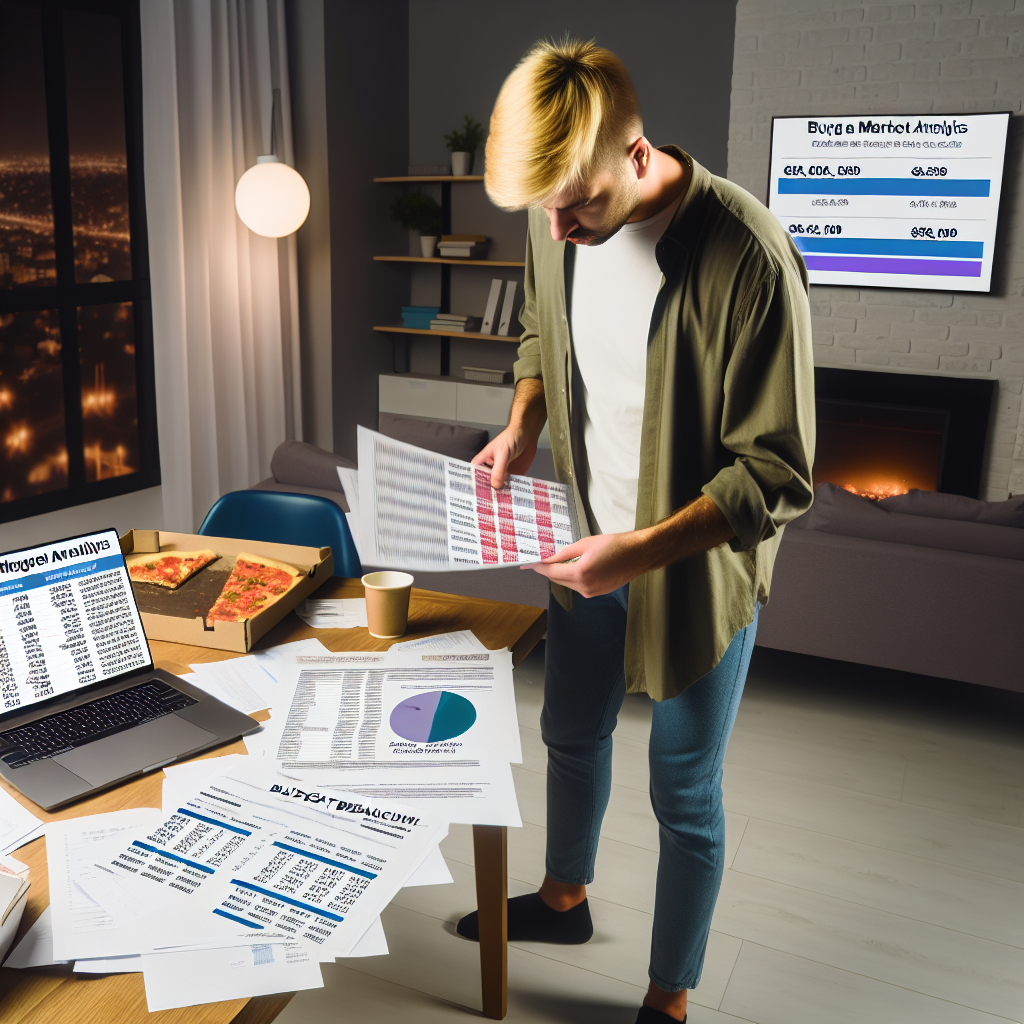Understanding Your Financial Standing
Evaluating Your Income
Begin by assessing your gross income.
This includes all sources of income you receive.
Consider your salary, bonuses, and any side jobs.
Next, calculate your net income.
This is the amount you take home after taxes.
Knowing your net income helps set realistic expectations.
Analyzing Your Savings
Your savings play a crucial role in homebuying.
Start by listing your current savings accounts.
Include checking, savings, and investment accounts.
Determine how much you can allocate toward a down payment.
Also, consider your emergency fund for unexpected costs.
Assessing Your Debts
It’s vital to evaluate your current debts.
List all debts including student loans, credit cards, and car loans.
Calculate your total monthly debt payments.
Additionally, find your debt-to-income ratio.
This ratio gives lenders insight into your financial health.
Building a Comprehensive Budget
Now that you’ve gathered information, create a budget.
Include all sources of income and monthly expenses.
Prioritize your expenses for better control.
Ensure to factor in homeownership costs.
These include mortgage payments, taxes, and insurance.
Calculating Your Home Affordability
The 28/36 Rule Explained
Understanding home affordability is crucial for first-time homebuyers.
The 28/36 rule is a helpful guideline in this process.
This rule suggests that you can spend up to 28% of your gross monthly income on housing costs.
Additionally, it emphasizes that total debt payments should not exceed 36% of your income.
Breaking Down the 28% Guideline
The first part of the rule focuses on housing costs.
This includes your mortgage payments, property taxes, and homeowners insurance.
It ensures that these expenses do not overwhelm your budget.
For example, if your gross income is $4,000, then your housing cost limit is $1,120.
Understanding the 36% Limit
The second part of the rule encompasses all debt obligations.
This includes housing costs, student loans, car payments, and credit card debt.
By following the 36% guideline, you keep your overall finances manageable.
For instance, using the same gross income of $4,000, your total debt should not exceed $1,440.
Calculating Your Numbers
To apply the 28/36 rule, start by calculating your gross monthly income.
Next, multiply this figure by 0.28 to find your housing cost limit.
Then, multiply your gross income by 0.36 to determine the total debt limit.
Using these calculations helps clarify your financial options.
Additional Considerations
While the 28/36 rule provides a solid foundation, consider your unique circumstances.
Factors like job stability, savings, and lifestyle play significant roles.
Adjust your calculations based on personal preferences and long-term goals.
It’s wise to prepare for unexpected expenses, like repairs and maintenance.
Identifying Upfront Costs
Down Payment
The down payment is a crucial element of your budget.
This amount typically ranges from 3% to 20% of the home’s price.
A higher down payment can reduce your mortgage payments.
It may also eliminate the need for private mortgage insurance.
Consider your savings and financial readiness before making this decision.
Closing Costs
Closing costs include various fees associated with the home purchase.
These can range from 2% to 5% of the loan amount.
Common closing costs include appraisal fees and title insurance.
Other fees can cover attorney services and loan origination.
Be prepared to pay these costs upfront at closing.
Other Fees
Additional fees can also impact your budget as a buyer.
Consider the costs for home inspections and surveys.
You may need to pay property taxes or homeowners association fees.
Insuring your new home is another expense to plan for.
Evaluate all potential costs to have a complete budget picture.
Explore Further: Best Practices For Environmental Safety In A Detailed Home Inspection Checklist
Exploring Mortgage Options: Fixed-Rate vs. Adjustable-Rate Mortgages
Understanding Fixed-Rate Mortgages
A fixed-rate mortgage provides stability for homeowners.
Your interest rate remains the same throughout the loan term.
This predictability makes budgeting easier.
Fixed-rate mortgages typically come in 15- or 30-year terms.
Choosing a fixed-rate mortgage is wise during low-interest periods.
Moreover, your monthly payments remain consistent.
Benefits of Fixed-Rate Mortgages
- Stable payments protect against fluctuations in interest rates.
- It’s easier to plan your budget long-term.
- Homeownership becomes less stressful with predictable payments.
Understanding Adjustable-Rate Mortgages
An adjustable-rate mortgage adjusts your interest rate over time.
Your initial rate is usually lower than a fixed-rate mortgage.
However, rates may increase after a set period.
This variability can lead to fluctuating monthly payments.
You should evaluate your risk tolerance before choosing this option.
Benefits of Adjustable-Rate Mortgages
- Lower initial rates can make homeownership accessible.
- There’s potential for lower payments in the early years.
- Adjustable rates can benefit those who plan to move soon.
Factors to Consider
Your financial situation influences your mortgage choice.
Consider how long you plan to stay in the home.
Evaluate the current interest rates in the market.
Additionally, think about your comfort level with financial uncertainty.
Consulting a Mortgage Advisor
Consulting a mortgage advisor can clarify your options.
They help assess your financial readiness.
Advisors can guide you through the mortgage application process.
Ultimately, their expertise can align your goals with the right mortgage.
Learn More: How to Negotiate with Sellers for the Best Deal on a Home
Budgeting for Ongoing Homeownership Costs
Understanding Property Taxes
Property taxes are a significant expense for homeowners.
They vary by location and depend on the property’s assessed value.
It’s essential to research the property tax rates in your area.
Once you know the rates, estimate your annual tax costs.
Include this amount in your monthly budget.
Keep in mind that property taxes can increase over time.
Plan for potential increases to avoid surprises.
The Importance of Home Insurance
Home insurance protects your property from unexpected disasters.
Consider various policies to find the best coverage for your needs.
Premium costs vary based on coverage levels and property location.
Get quotes from multiple insurance providers for comparison.
Include the insurance premium in your monthly budgeting.
Review your policy annually for any necessary adjustments.
Understand the deductible you may have to pay during claims.
Budgeting for Maintenance and Repairs
Maintaining your home is crucial for its long-term value.
Set aside funds for routine maintenance and unexpected repairs.
A common guideline is to allocate 1% of your home’s value annually.
This will help cover repairs like plumbing issues or roof leaks.
Regular maintenance can prevent larger expenses down the road.
Keep a checklist of seasonal tasks to stay organized.
Consider hiring professionals for complex issues.
Additional Ongoing Costs
Besides property taxes, insurance, and maintenance, other costs exist.
Utilities such as electricity, gas, and water are recurring expenses.
Include garbage collection and sewage fees in your budget as well.
Homeowner association (HOA) fees may apply if you live in a community.
Factor in landscaping and lawn care expenses, if necessary.
Plan for any additional services you might require regularly.
Explore Further: Home Inspection Checklist For Ensuring Structural Integrity Of Homes

Setting a Realistic Budget
The Importance of Lifestyle and Future Plans
Determining your budget starts with understanding your lifestyle needs.
Your lifestyle dictates how much you need to spend on a home.
Consider your daily activities and routines.
Will you frequently commute for work or leisure?
This factor significantly affects housing location and price.
Evaluate your social and recreational needs as well.
Are you an avid entertainer or do you prefer quiet evenings?
These preferences can help shape your purchasing choices.
Next, think about your long-term goals.
Do you plan to have a family in the near future?
Understanding your future plans is critical for budget planning.
More space may be required if you anticipate growth.
Also, consider your career trajectory.
Will your job require relocation or potential promotions?
Flexibility in your budget can accommodate unforeseen changes.
Saving for renovations is another wise consideration.
Many buyers find their ideal home needs some fixes.
Factor in these costs when establishing your budget.
Lastly, do not forget to account for lifestyle-related expenses.
These can include utilities, groceries, and transportation.
Your overall financial health will benefit from a well-rounded budget.
Budgeting for leisure activities and hobbies can improve quality of life.
Given all these factors, create a detailed financial plan.
Track your estimations regularly to stay on target.
This proactive approach empowers you to make informed decisions.
Ultimately, a realistic budget leads to a satisfying homebuying experience.
Learn More: Home Inspection Checklist For Understanding Environmental Hazards
Utilizing Online Calculators and Tools
The Importance of Budgeting
Budgeting is crucial for first-time homebuyers.
It helps determine how much house you can afford.
Moreover, it helps prevent financial strain in the future.
Finding Reliable Online Calculators
Many websites offer home affordability calculators.
For instance, Zillow and Realtor.com provide user-friendly tools.
These calculators estimate monthly mortgage payments.
They consider factors like income, debt, and down payment.
Using Mortgage Calculators Effectively
Start by entering your annual income.
Include any extra income sources as well.
Next, input your current debts and expenses.
This information refines your affordability estimates.
Understanding the Results
Your calculator results include various mortgage scenarios.
Examine interest rates, loan terms, and monthly payments.
Moreover, check how different down payments affect costs.
This insight helps you make informed decisions.
Additional Resources and Tools
Consider using budgeting tools like Mint or YNAB.
These resources track expenses and manage budgets.
Furthermore, they provide insights on saving for a down payment.
Consulting With Professionals
While online tools are helpful, consulting professionals is wise.
A mortgage broker can offer personalized advice.
They assist in breaking down your financial picture.
Additionally, they can help you navigate loan options.
Seeking Professional Guidance
The Importance of Financial Advisors
Financial advisors provide essential insights for first-time homebuyers.
They help you understand your budget and financial options.
This guidance reduces the risk of costly mistakes.
Moreover, they can analyze your income, expenses, and savings.
In addition, they assist in creating a realistic home-buying budget.
A good financial advisor also helps with mortgage options.
The Role of Real Estate Agents
Real estate agents are valuable allies in the homebuying process.
They have access to local market trends and property listings.
Furthermore, they can negotiate on your behalf effectively.
Agents also provide insights on neighborhood values and schools.
This information is crucial in determining your budget.
Additionally, they can recommend reliable home inspectors and lenders.
Collaboration for Success
Working with both professionals enhances your homebuying experience.
They can coordinate to ensure your financial and property goals align.
This teamwork leads to a smoother transaction process.
Ultimately, their expertise helps you make informed decisions.
Additional Resources
What exactly is buying a house that is up for auction, and is it a good …




